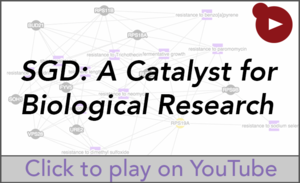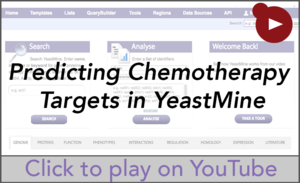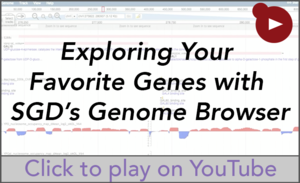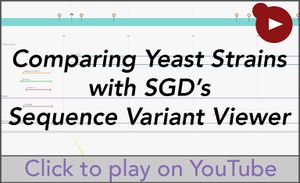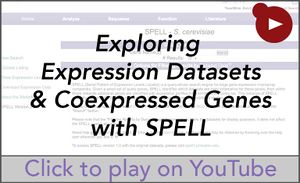Difference between revisions of "SGD Webinar Series"
| Line 14: | Line 14: | ||
| − | [[File:SGD-webinars-youtube-2.png|300px||link=https://www.youtube.com/watch?v= | + | [[File:SGD-webinars-youtube-2.png|300px||link=https://www.youtube.com/watch?v=-Qefg1gm7ho]] |
===May 4, 2016 – Predicting Chemotherapy Targets in YeastMine=== | ===May 4, 2016 – Predicting Chemotherapy Targets in YeastMine=== | ||
If you’re not already using YeastMine to answer all your questions about ''S. cerevisiae'' genes and gene products… you should be! SGD's YeastMine is a powerful search tool that can retrieve, compare, and analyze data on thousands of genes at a time, greatly reducing the time needed to answer practical research questions. Through YeastMine, questions such as "What proportion of plasma membrane proteins are essential?" or "How many different gene products physically interact with the mitochondrial ribosome?" can be answered within minutes. This short webinar provides a brief tutorial on how to run queries and save gene lists in YeastMine, and demonstrates a research scenario where yeast-human homology data is used to predict potential chemotherapy targets. | If you’re not already using YeastMine to answer all your questions about ''S. cerevisiae'' genes and gene products… you should be! SGD's YeastMine is a powerful search tool that can retrieve, compare, and analyze data on thousands of genes at a time, greatly reducing the time needed to answer practical research questions. Through YeastMine, questions such as "What proportion of plasma membrane proteins are essential?" or "How many different gene products physically interact with the mitochondrial ribosome?" can be answered within minutes. This short webinar provides a brief tutorial on how to run queries and save gene lists in YeastMine, and demonstrates a research scenario where yeast-human homology data is used to predict potential chemotherapy targets. | ||
Revision as of 14:39, 9 September 2016
About the SGD Webinar Series:
The SGD Webinar Series is a series of interactive webcasts aimed at demonstrating the SGD website and the value of yeast as a model organism. Information about previous and upcoming webinars can be found on this page or at the SGD newsfeed (http://www.yeastgenome.org/blog). Video recordings of previous webinars are always uploaded at the SGD YouTube channel (https://www.youtube.com/SaccharomycesGenomeDatabase)
Contents
- 1 Upcoming Webinars
- 2 Previous Webinars
- 2.1 April 6, 2016 – SGD: A Catalyst for Biological Research
- 2.2 May 4, 2016 – Predicting Chemotherapy Targets in YeastMine
- 2.3 June 1, 2016 – Exploring Your Favorite Genes with SGD's Genome Browser
- 2.4 August 3, 2016 – Comparing Yeast Strains with SGD's Sequence Variant Viewer
- 2.5 September 7, 2016 – Exploring Expression Datasets & Coexpressed Genes with SPELL
Upcoming Webinars
Next in the SGD Webinar Series: Details Coming Soon
More information on our next webinar will be posted here and on the SGD blog. Stay tuned!
Previous Webinars
April 6, 2016 – SGD: A Catalyst for Biological Research
Function is just one of many important angles to consider a gene and its product. Other concepts like regulation, genetic/physical interactions, phenotypes, are critical to understanding how a gene fits into the overall biology of the cell. By quickly connecting users to high-quality annotations, different types of data, and useful tools to explore the yeast genome, SGD acts as a catalyst for biological research and has become an indispensable resource for many scientists. This short webinar provides an overview of the different ways you can find information about your favorite genes in SGD.
May 4, 2016 – Predicting Chemotherapy Targets in YeastMine
If you’re not already using YeastMine to answer all your questions about S. cerevisiae genes and gene products… you should be! SGD's YeastMine is a powerful search tool that can retrieve, compare, and analyze data on thousands of genes at a time, greatly reducing the time needed to answer practical research questions. Through YeastMine, questions such as "What proportion of plasma membrane proteins are essential?" or "How many different gene products physically interact with the mitochondrial ribosome?" can be answered within minutes. This short webinar provides a brief tutorial on how to run queries and save gene lists in YeastMine, and demonstrates a research scenario where yeast-human homology data is used to predict potential chemotherapy targets.
- For reference, the list of human tumor suppressors that was analyzed during the webinar is provided here: File:TSGene-LOFdataset.xlsx
June 1, 2016 – Exploring Your Favorite Genes with SGD's Genome Browser
SGD's JBrowse is a quick and easy way to browse through the information-rich yeast genome. Using JBrowse, you can visualize spatial relationships between genes, locate SGD annotations throughout the yeast genome, and compare chromosomal features to hundreds of experimental data sets. This short webinar demonstrates how to navigate the genome with JBrowse, locate your favorite genes or chromosomal features, and visualize experimental data with data tracks. Whether you're an experienced GBrowse user looking to try JBrowse for the first time or someone new to genome browsing as a whole, this webinar is sure to help you get started.
August 3, 2016 – Comparing Yeast Strains with SGD's Sequence Variant Viewer
SGD's Variant Viewer is an easy-to-learn web application that allows visualization of differences in both gene and protein sequences. With Variant Viewer, you can compare the nucleotide and amino acid sequences of your favorite genes in twelve widely-used S. cerevisiae strains. This brief webinar demonstrates how to use Variant Viewer to compare nucleotide and amino acid sequences of different S. cerevisiae genomes, and how to visualize strain-specific single nucleotide polymorphisms, insertions, and deletions contained within a given open reading frame.
September 7, 2016 – Exploring Expression Datasets & Coexpressed Genes with SPELL
Trying to find relevant expression datasets or genes with similar expression profiles for your favorite genes? Look no further than SPELL – the Serial Pattern of Expression Levels Locator. Given a set of genes, SGD’s instance of SPELL locates informative expression datasets from over 270 published studies and pairs the genes in your query with additional coexpressed genes. Learn how to run a multi-gene query in SPELL, locate expression datasets relevant to your query, and find genes with similar expression profiles in this quick webinar.

